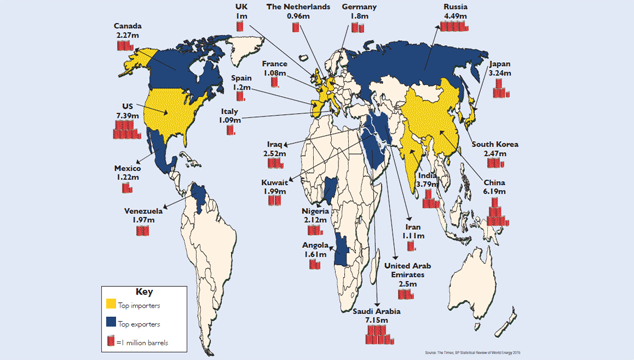Get the latest financial news, insights and expert analysis from our award-winning MoneyWeek team, to help you understand what really matters when it comes to your finances.
You are now subscribed
Your newsletter sign-up was successful
Want to add more newsletters?

Twice daily
MoneyWeek
Get the latest financial news, insights and expert analysis from our award-winning MoneyWeek team, to help you understand what really matters when it comes to your finances.

Four times a week
Look After My Bills
Sign up to our free money-saving newsletter, filled with the latest news and expert advice to help you find the best tips and deals for managing your bills. Start saving today!

How the oil-price slump is reshaping the world
The map aboveshows the world's biggest oil importers (in yellow) andexporters (in dark blue). Unsurprisingly, with the price of Brentcrude now below $50 a barrel, compared to $100 just 18 monthsago, exporters have been hit hard by the slump.
Saudi Arabia which produces oil at dirt-cheap prices butneeds a high price per barrel to sustain current public spending has been forced to raise money on global bond markets forthe first time in eight years. Other Middle Eastern economieshave been hit just as hard, while Russia, one of the largest oilproducers in the world, is now in recession and could staythere for quite some time if the oil price drops much further.
Shortly before the slump, state-owned Gazprom tied itself intoa £256bn 30-year oil-supply deal with China, which offers it noprotection against a low oil price. Even at current prices, saysthe FT, the project is unprofitable. And Norway, which owns theworld's biggest sovereign wealth fund, built on oil profits, ishaving to dip into its savings as it faces a slump that is likely tocost the country more jobs than the 2008 recession.
MoneyWeek
Subscribe to MoneyWeek today and get your first six magazine issues absolutely FREE

Sign up to Money Morning
Don't miss the latest investment and personal finances news, market analysis, plus money-saving tips with our free twice-daily newsletter
Don't miss the latest investment and personal finances news, market analysis, plus money-saving tips with our free twice-daily newsletter
None of this bodes well for political stability in the world's more volatile regions. However, there have been plenty of winnerstoo. Large importers of oil including China, India and Japan have benefited from falling costs, which in turn boost consumerspending.
The US has reduced its dependency on imported oiland is even starting to loosen its long-held ban on exporting oil,as a recent deal to swap supplies with Mexico demonstrates.On the other hand, there's no doubt that the plunge has hit thefracking industry hard, with companies slashing spending.
Get the latest financial news, insights and expert analysis from our award-winning MoneyWeek team, to help you understand what really matters when it comes to your finances.
MoneyWeek is written by a team of experienced and award-winning journalists, plus expert columnists. As well as daily digital news and features, MoneyWeek also publishes a weekly magazine, covering investing and personal finance. From share tips, pensions, gold to practical investment tips - we provide a round-up to help you make money and keep it.
-
 Can mining stocks deliver golden gains?
Can mining stocks deliver golden gains?With gold and silver prices having outperformed the stock markets last year, mining stocks can be an effective, if volatile, means of gaining exposure
-
 8 ways the ‘sandwich generation’ can protect wealth
8 ways the ‘sandwich generation’ can protect wealthPeople squeezed between caring for ageing parents and adult children or younger grandchildren – known as the ‘sandwich generation’ – are at risk of neglecting their own financial planning. Here’s how to protect yourself and your loved ones’ wealth.

